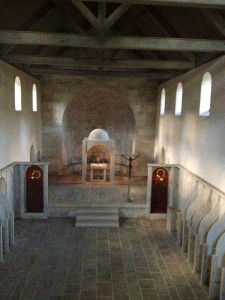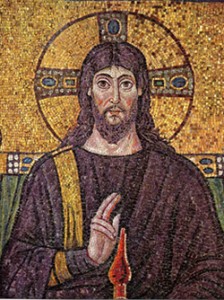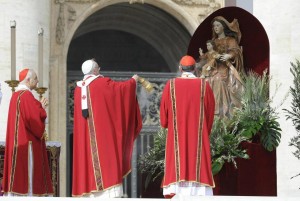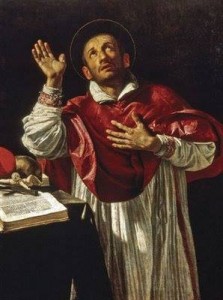 I am convinced, after reading Benedict XVI letter to the archbishop of Milan on Saint Charles Borromeo, that this saint and churchman is one of the pivotal keys of my own conversion, and that of all Catholics. I always seem to go back to the former Pope’s guidance for some obvious reasons. Benedict is such a clear writer and thinker; he gives the key points to our life in Jesus Christ through the witness of this great saint of Milan! Perhaps you will think the same. Listen to Benedict XVI; follow the good example of Saint Charles. You will have to conclude that Borromeo cannot go unnoticed or unheeded.
I am convinced, after reading Benedict XVI letter to the archbishop of Milan on Saint Charles Borromeo, that this saint and churchman is one of the pivotal keys of my own conversion, and that of all Catholics. I always seem to go back to the former Pope’s guidance for some obvious reasons. Benedict is such a clear writer and thinker; he gives the key points to our life in Jesus Christ through the witness of this great saint of Milan! Perhaps you will think the same. Listen to Benedict XVI; follow the good example of Saint Charles. You will have to conclude that Borromeo cannot go unnoticed or unheeded.
Blessed feast to the the Church in Milan and to the Fraternity of Saint Charles Borromeo.
With the Church, we pray,
Preserve in the midst of your people, we ask, O Lord, the spirit with which you filled the Bishop Saint Charles Borromeo, that your Church may be constantly renewed and, by conforming herself to the likeness of Christ, may show his face to the world.
The Pope emeritus writes:
Lumen caritatis. The light of charity of St Charles Borromeo has illumined the whole Church and, by renewing the miracles of the love of Christ, our Supreme and Eternal Pastor, has brought new life and new youthfulness to God’s flock, which was going through sorrowful and difficult times. For this reason I join with all my heart in the joy of the Ambrogian Archdiocese in commemorating the fourth centenary of the Canonization of this great Pastor on 1 November 1610.
1. The time in which Charles Borromeo lived was very delicate for Christianity. In it the Archbishop of Milan gave a splendid example of what it means to work for the reform of the Church. There were many disorders to sanction, many errors to correct and many structures to renew; yet St Charles strove for a profound reform of the Church, starting with his own life. It was in himself, in fact, that the young Borromeo promoted the first and most radical work of renewal. His career had begun promisingly in accordance with the canons of that time: for the younger son of the noble family Borromeo, a future of prosperity and success lay in store, an ecclesiastical life full of honours but without any ministerial responsibilities; he also had the possibility of assuming the direction of the family after the unexpected death of his brother Federico.
Yet Charles Borromeo, illumined by Grace, was attentive to the call with which the Lord was attracting him and desiring him to dedicate the whole of himself to the service of his people. Thus he was capable of making a clear and heroic detachment from the lifestyle characterised by his worldly dignity and dedication without reserve to the service of God and of the Church. In times that were darkened by numerous trials for the Christian community, with divisions and confusions of doctrine, with the clouding of the purity of the faith and of morals and with the bad example of various sacred ministries, Charles Borromeo neither limited himself to deploring or condemning nor merely to hoping that others would change, but rather set about reforming his own life which, after he had abandoned wealth and ease, he filled with prayer, penance and loving dedication to his people. St Charles lived heroically the evangelical virtues of poverty, humility and chastity, in a continuous process of ascetic purification and Christian perfection.
He was aware that a serious and credible reform had to begin precisely with Pastors if it was to have beneficial and lasting effects on the whole People of God. In this action of reform he was able to draw from the traditional and ever living sources of the Catholic Church: the centrality of the Eucharist, in which he recognized and proposed anew the adorable presence of the Lord Jesus and of his Sacrifice of love for our salvation; the spirituality of the Cross as a force of renewal, capable of inspiring the daily exercise of the evangelical virtues; assiduous reception of the Sacraments in which to accept with faith the action of Christ who saves and purifies his Church; the word of God, meditated upon, read and interpreted in the channel of Tradition; love for and devotion to the Supreme Pontiff in prompt and filial obedience to his instructions as a guarantee of full ecclesial communion.
The extraordinary reform that St Charles carried out in the structures of the Church in total fidelity to the mandate of the Council of Trent was also born from his holy life, ever more closely conformed to Christ. His work in guiding the People of God, as a meticulous legislator and a brilliant organizer was marvellous. All this, however, found strength and fruitfulness in his personal commitment to penance and holiness. Indeed this is the Church’s primary and most urgent need in every epoch: that each and every one of her members should be converted to God. Nor does the ecclesial community lack trials and suffering in our day and it shows that it stands in need of purification and reform. May St Charles’ example always spur us to start from a serious commitment of personal and community conversion to transform hearts, believing with steadfast certainty in the power of prayer and penance. I encourage sacred ministers, priests and deacons in particular to make their life a courageous journey of holiness, not to fear being drunk with that trusting love for Christ that made Bishop Charles ready to forget himself and to leave everything. Dear brothers in the ministry, may the Ambrogian Church always find in you a clear faith and a sober and pure life that can renew the apostolic zeal which St Ambrose, St Charles and many of your holy Pastors possessed!
2. During St Charles’ episcopate, the whole of his vast diocese felt infected with a current of holiness that spread to the entire people. How did this Bishop, so demanding and strict, manage to fascinate and to win over the Christian people? The answer is easy: St Charles enlightened the people and enticed them with the ardour of his love. “Deus caritas est”, and where there is a living experience of love the profound Face of God who attracts us and makes us his own is revealed.
The love of St Charles Borromeo was first and foremost the love of the Good Shepherd who is ready to give his whole life for the flock entrusted to his care, putting the demands and duties of his ministry before any form of personal interest, amenity or advantage. Thus the Archbishop of Milan, faithful to the Tridentine directives, visited several times his immense Diocese even the most remote localities, and took care of his people, nourishing them ceaselessly with the Sacraments and with the word of God through his rich and effective preaching; he was never afraid to face adversities and dangers to defend the faith of the simple and the rights of the poor.
St Charles, moreover, was recognized as a true and loving father of the poor. Love impelled him to empty his home and to give away his possessions in order to provide for the needy, to support the hungry, to clothe and relieve the sick. He set up institutions that aimed to provide social assistance and to rescue people in need; but his charity for the poor and the suffering shone out in an extraordinary way during the plague of 1576 when the holy Archbishop chose to stay in the midst of his people to encourage them, serve them and defend them with the weapons of prayer, penance and love.
Furthermore it was charity that spurred Borromeo to become an authentic and enterprising educator: for his people with schools of Christian doctrine; for the clergy with the establishment of seminaries; for children and young people with special initiatives for them and by encouraging the foundation of religious congregations and confraternities dedicated to the formation of children and young people.
Charity was always the deep motive of the severity with which St Charles practiced fasting, penance and mortification. For the holy Bishop it was not only a matter of ascetic practices aiming for his own spiritual perfection but rather of a true ministerial means for expiating sins, for invoking the conversion of sinners and for interceding for his children’s needs.
Throughout his life, therefore, we may contemplate the light of evangelical charity, of forbearing, patient and strong love that “bears all things, believes all things, hopes all things, endures all things” (1 Cor 13:7). I thank God that the Church of Milan has always had a wealth of vocations especially dedicated to charity; I praise the Lord for the splendid fruits of love for the poor, of service to the suffering and of attention to youth of which it can be proud. May St Charles’ example of prayer obtain that you may be faithful to this heritage, so that every baptized person can live out in contemporary society that fascinating prophecy which, in every epoch, is the love of Christ alive in us.
3. However it is impossible to understand the charity of St Charles Borromeo without knowing his relationship of passionate love with the Lord Jesus. He contemplated this love in the holy mysteries of the Eucharist and of the Cross, venerated in very close union with the mystery of the Church. The Eucharist and the Crucified One immersed St Charles in Christ’s love and this transfigured and kindled fervour in his entire life, filled his nights spent in prayer, motivated his every action, inspired the solemn Liturgies he celebrated with the people and touched his heart so deeply that he was often moved to tears.
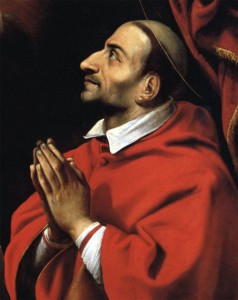 His contemplative gaze at the holy Mystery of the Altar and at the Crucified one stirred within him feelings of compassion for the miseries of humankind and kindled in his heart the apostolic yearning to proclaim the Gospel to all. On the other hand we know well that there is no mission in the Church which does not stem from “abiding” in the love of the Lord Jesus, made present within us in the Eucharistic Sacrifice. Let us learn from this great Mystery! Let us make the Eucharist the true centre of our communities and allow ourselves to be educated and moulded by this abyss of love! Every apostolic and charitable deed will draw strength and fruitfulness from this source!
His contemplative gaze at the holy Mystery of the Altar and at the Crucified one stirred within him feelings of compassion for the miseries of humankind and kindled in his heart the apostolic yearning to proclaim the Gospel to all. On the other hand we know well that there is no mission in the Church which does not stem from “abiding” in the love of the Lord Jesus, made present within us in the Eucharistic Sacrifice. Let us learn from this great Mystery! Let us make the Eucharist the true centre of our communities and allow ourselves to be educated and moulded by this abyss of love! Every apostolic and charitable deed will draw strength and fruitfulness from this source!
4. The splendid figure of St Charles suggests to me a final reflection which I address to young people in particular. The history of this great Bishop was in fact totally determined by some courageous “yeses”, spoken when he was still very young. When he was only 24 years old he decided to give up being head of the family to respond generously to the Lord’s call; the following year he accepted priestly and episcopal Ordination. At the age of 27 he took possession of the Ambrogian Diocese and gave himself entirely to pastoral ministry. In the years of his youth St Charles realized that holiness was possible and that the conversion of his life could overcome every bad habit. Thus he made his whole youth a gift of love to Christ and to the Church, becoming an all-time giant of holiness.
Dear young people, let yourselves be renewed by this appeal that I have very much at heart: God wants you to be holy, for he knows you in your depths and loves you with a love that exceeds all human understanding. God knows what is in your hearts and is waiting to see the marvellous gift he has planted within you blossom and bear fruit. Like St Charles, you too can make your youth an offering to Christ and to your brethren. Like him you can decide, in this season of life, “to put your stakes” on God and on the Gospel. Dear young people, you are not only the hope of the Church; you are already part of her present! And if you dare to believe in holiness you will be the greatest treasure of your Ambrogian Church which is founded on Saints.
Venerable Brother, I joyfully entrust these reflections to you and as I invoke the heavenly intercession of St Charles Borromeo and the constant protection of Mary Most Holy, I warmly impart to you and to the entire Archdiocese a special Apostolic Blessing.
From the Vatican, 1 November 2010, the fourth centenary of the canonization of St Charles Borromeo.
Pope Benedict XVI
This letter addressed Dionigi Cardinal Tettamanzi, Archbishop of Milan, on the occasion of the 400th Anniversary of the Canonization of Saint Charles Borromeo.



